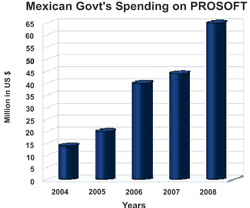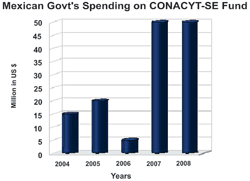Mexican government has been supporting the innovation and technological development of small businesses and also giving support to sectors of great impact such as the ICTs
Introduction
It is important for developing countries to adopt ICT technologies especially in small to mid size businesses, to improve processes, efficiency and be more competitive. The problem is that many small to mid size companies do not know where to go or they think that they cannot afford it. Very few would be able to pay for servers and staff to maintain them. Therefore, we are working to provide software as a service with applications hosted on central servers for small businesses. There are many current developments of creating platforms, such as Amazon’s web services (Elastic Compute Cloud {EC2}, Simple Database {Simple DB} and Simple Storage Service {S3}), and Google’s App Engine. We believe that to enhance competitiveness it is important to provide low cost solutions and help SMEs adopt ICT technologies based on these platforms as quickly as possible.
Softwares can be delivered as a service rather than an upfront purchase. This is a very important step in making software accessible with no need to install and maintain servers locally in order to get the benefits of ICT. This also allows service providers to serve customers at a distance, with no need to visit customer sites to maintain and patch servers, install updates, do backups, etc. There is a disadvantage that it requires Internet connectivity, and when the connection is down, the system cannot be used. However, it is really the only way possible to serve some customers at the price points necessary.
Towards automated management systems
But to get the full benefit, of ICTs, companies must re-engineer business processes too They must convert papers based systems to data entry systems and automate the collection of data. Manufacturers, have to automate the collection of data from manufacturing systems into the ICT framework. Bar codes or RFID can be employed to automate the collection of information when products are shipped or moved for any reason. Automatic submission of customer orders to the factory floor, and the status of orders automatically fed back to salesmen and customers, can greatly decrease the cost of processing and shipping orders, and increase customer satisfaction. Automatic collection of information can also make planning easier, efficient and allow management to identify and fix bottlenecks.
Serving rural communities
Rural communities have traditionally been underserved and left out of the process of moving to ICTs. Internet access to rural communities will provide impetus for the adoption of ICT technologies. There are emerging low cost technologies such as point-to-point 802.11 being developed by Intel and others that will reduce the cost of long distance point-to-point connections to hundreds of dollars per tower. This will allow rural communities to take advantage of online applications and be served from a distance by service providers in a very cost effective manner. Without Internet access, many rural businesses will be left out of the ICT revolution and be at a competitive disadvantage. The government and universities have a huge role to play in getting Internet access to rural communities at an affordable cost, and just as important, develop the industry that can provide ICT to rural communities. Many of the technologies developed for rural communities can also serve to provide low cost solutions for urban companies with limited financial resources. The government can also play a role in getting low cost Internet service to urban businesses.
Business in need of services (Demand)
Business and users’ community in general demand for: cost reduction, access, teaching, training and counseling services and a large information campaign to be aware of the opportunities, uses and costs etc. from their suppliers.
Providers, as well as the traditional industries are found in large, medium and small sizes, a majority of them work with private platforms and in quality and certification systems that give them more security, but this raises the prices of the products or services.
The Mexican experience
In Mexico, nowadays there are several programmes in operation to support innovation and industrial development, including more or less support of the ICTs, through promotion and credit schemes, that are described below.
Promotional programmes
PROSOFT
‘The Programme for the Development of the Software Industry’ (PROSOFT) has been operating for the last six years, with the aim to drive the development of IT sector through temporal support to work on projects for the creation, development, consolidation and productivity enhancement and sustainability of enterprises of the information, communication and services industries. From 2004 to 2008, the federal government allocated an equivalent of US$ 183 million for this purpose, as shown in figure 1.

46% of the budget was for project development and quality certification of products, the rest for activities like: Events, Promotion, Training, Development Centre and others. Small and Medium Enterprises (SMEs) are supported by upto 70% of the total Project cost.
CONACYT-SE Fund
 The ‘Fund for Innovation’ established between the National Council for Science and Technology (CONACYT) and the Economics Secretary (SE) has been operating for more than five years supporting projects from the SMEs that want to develop projects to increase their level of competitiveness through the development of new products, processes or services.
The ‘Fund for Innovation’ established between the National Council for Science and Technology (CONACYT) and the Economics Secretary (SE) has been operating for more than five years supporting projects from the SMEs that want to develop projects to increase their level of competitiveness through the development of new products, processes or services.
The SMEs receive support for up to 50% of the total cost of the project. From 2004 to 2008 the fund has given resources to the tune of US $ 140 Million. Please refer to the following figure:
Credit Programmes
Support Fund for the Micro, Small and Medium Enterprises (FONDO PYME)
It is an instrument to support smaller enterprises and entrepreneurs with the purpose of promoting national economic development, through granting temporal supports to projects and programmes that encourage creation, development, consolidation, competitiveness and sustainability of micro, small and medium enterprises.
The credit is up to US $ 150,000 for a project with 0% rate of interest, and up to 80% of the project value, with a repayment term of 48 months, it is necessary to have a guarantor to avail of this credit facility. Between 2004 and 2008 US $ 1,141 million were handled. In 2006, 994 projects were supported, 422 of which were for the creation and strengthening of enterprises, technological development and innovation.
The Fund Jalisco for Entre- preneur Promotion (FOJAL)
FOJAL is only for the State of Jalisco. FOJAL supports the creation, survival and consolidation of SMEs. The maximum credit limit is US $ 100,000, with an annual rate of 9%. The repayment period varies between 24 to 60 months. It is necessary to have a guarantor/endorser to avail of this fund.
Private banks
The Private Bank has an objective to give credit to persons and enterprises so they can generate capital and satisfy their capital necessities. From 2002 the Federal Government has established a programme called ‘National Guarantee System’, with the participation of Economics Secretary and Nacional Financiera (State Bank). This programme offers the SMEs the benefit to access financing for productive projects through the main bank institutions without the need to guarantee this financing with a hypothec. The financing can be up to US $ 200,000 with rates of TIIE +6% up to TIIE +18%, with terms up to 60 months with no hypothec guarantee.
During the last four years, the University of Guadalajara (Mexico) has participated in two projects with an aim to introduce ICTs in the SMEs: e-Industrial Chain, with the support of the FOMIN (Multilateral Investment Fund); and for the creation and development of new enterprises in the regional context: e-Network for Innovation and Incubation, with the support of InfoDev. The results of these projects were surprising due to the participation of SMEs in the introduction of solutions to administrate manufacturing, as well as in business incubators and entrepreneurs for training, counseling and communications.
Conclusion
It is well known that use of technology in the industry, government and universities is a way to enhance economic and social productivity; but it is even better when Information and Communications Technologiesare incorporated in their daily lives. In the developing countries, ICTs help introduce services as health, social security and education and give the same opportunities to all the communities in order to have a better life.
Be a part of Elets Collaborative Initiatives. Join Us for Upcoming Events and explore business opportunities. Like us on Facebook , connect with us on LinkedIn and follow us on Twitter, Instagram.











